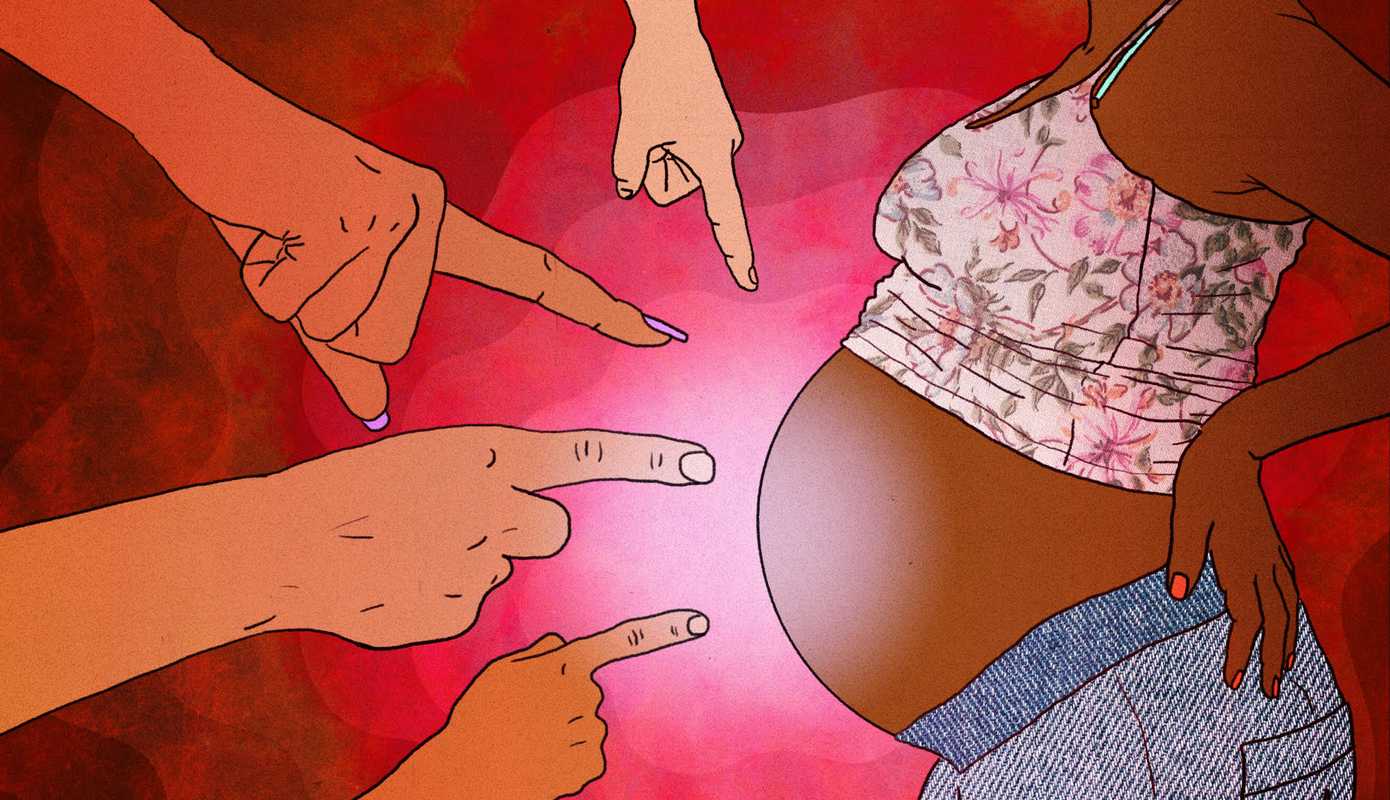This article was made possible by donations to the Black Creatives Fund. Donate now.
In early 2019, a niche environmental campaign shot to mainstream prominence: people were pledging not to have children, in order to draw attention to the climate crisis. The self-styled ‘Birthstrikers’ – an ostensibly ‘international’ movement founded and largely populated by white, middle-class people in the UK and other Global North countries – were lauded in the press as catalysts for change in the face of climate breakdown. But in bringing together reproduction and climate change, the Birthstrikers had waded into a dark corner of environmentalism riddled with racism, xenophobia and even eugenics, where the reproductive rights of the global poor and people of colour can be sacrificed in order to curb the climate crisis.
The argument goes that reducing population growth is one of the most impactful ways of reducing carbon emissions. Many high-profile commentators such as British naturalists Chris Packham, Jane Goodall and even national treasure David Attenborough have publicly declared their support for reducing the global population to slow climate change. But it’s always particular groups of people that are singled out as the populations that need reducing – and those groups aren’t white, middle-class people in the Global North.
A paper published in the British Medical Journal in January 2020, ‘Climate change and contraception’, focuses on the fact that birth rates are generally higher in countries in the Global South than in wealthy Global North countries. This fixation is common, but it places responsibility with those who have contributed the least to global carbon emissions. Around the same time that paper was published at the start of this year, Oxfam released a study which found that the average Briton takes less than two weeks to emit as much carbon as a citizen of a number of African nations will in an entire year.
So it’s not as simple as more people = more climate change. One way to calculate human impact on the natural environment is this simple formula developed in the 1970s: Impact = Population x Affluence x Technology. This means that in countries where the birth rate is low, when people get rich and have constant access to technology, the impact on the environment rises. And on the flipside, high birth rates, if in countries with lower levels of wealth and technology, actually have far less of an environmental impact.
What happens when reproductive justice is ignored?
People who support attempts to slow population growth in sub-Saharan Africa and South Asia often propose ensuring use of contraception as the right way to tackle the problem – including the authors of ‘Climate change and contraception’. But stopping people having children in order to fix broader social, economic or environmental problems has a long sexist, ableist, classist and racist history.
By the end of World War II, the Nazis had sterilised 400,000 individuals with disabilities, mental health problems and illnesses that were feared to be hereditary. In India during the State of Emergency from 1975 to 1977, an estimated six million lower caste men were subject to coerced vasectomies. For over a century the US has sterilised incarcerated individuals, coercing consent by offering more lenient sentencing in exchange for ‘voluntary’ sterilisation or contraception – a practice that continues to the present day.
In the 1960s and 70s, as many as one in four Native American women were sterilised without their knowledge or consent, as part of misguided efforts at public healthcare informed by the racist assumption that Native American women were not mentally capable of managing their own reproduction. Between the 1930s and 1970s, around a third of all Puerto Rican women were sterilised in an attempt to reduce poverty and unemployment, which the local government attributed to overpopulation.
More recently, reproductive control has come to serve relentlessly inhuman capitalist demands. In Beed district in India’s Maharashtra state, thousands of young, poor, rural women have undergone elective hysterectomies to help them work faster, undergoing expensive and unnecessary surgeries based on the perception that menstruation hinders productivity.
The climate change ‘solution’ of using contraception to control population growth sits within this paternalistic legacy of enforcing control rather than facilitating conditions for free choice. Which is ironic, because given the resources to choose, people will opt for smaller families. The number of years that girls spend in education affects the number of children they go on to have. Supporting access to income opportunities outside the home directly affects their family planning decisions. And yet the focus on birth control in the Global South persists – ‘control’ being the key word here.
While wealthy white people in the Global North are celebrated for making the choice not to have children, people of colour in the Global South – who are denied the means to make that choice for themselves through a lack of income or education – are villainised for a crisis they did not create, and targeted for control. It should not be lost on us that lacking income and education in part of the Global South are often a result of centuries of European imperialist expansion.
Eco-fascism
There is a limit to the level of ecological impact the Earth can sustain. But over-consumption, not overpopulation, is the main factor in determining how far the Earth’s ability to renew its resources and support life can become compromised. Failure to understand and acknowledge that is a key part of eco-fascism, a belief system that marries environmentalism and racism. Its acolytes blame people of colour, especially immigrants, for the climate crisis; call for hardened, more brutal borders; commit mass murder in the name of protecting the natural world; and even see climate change itself as a kind of divine purge of humanity. Remember those early lockdown photos of nature ‘healing itself’, proving that ‘humans are the virus’? That fits neatly into the eco-fascist worldview.
Though Birthstrike tried hard to distance itself from the eco-fascist population control argument, it eventually became clear to the founders that it was impossible, and to avoid further feeding the dangerous overpopulation narrative, they announced that the campaign would be officially ending on the 1st of September 2020. In a recent statement referencing the death of George Floyd and global Black Lives Matter protests, the founders wrote:
“We have to concede that we underestimated the power of ‘overpopulation’ as a growing form of climate breakdown denial – even in some of our most revered scientists and fellow climate activists. As an increasing number of people take in the reality of societal collapse in the climate crisis, and the passing of the Holocene, we realise that fear and anxiety is likely to make ‘overpopulation’ an increasingly attractive focus to many. It has become clear that this is fed by, and will feed into, division and eco-fascism.”
Decolonising contraception
If our efforts to slow climate change and protect human life are to avoid feeding eco-fascism, they have to include reproductive justice. One organisation bringing current and historical reproductive rights atrocities to the foreground is not-for-profit community interest group Decolonising Contraception. Founded in 2018 by Dr Annabel Sowemimo, Decolonising Contraception aims to promote discussion on how culture and history impacts on sexual and reproductive health, particularly among previously colonised populations. Much of the collective’s work involves unpacking how and why colonial history makes some communities more wary of engaging with medical care, through the programming of panel discussions, workshops, podcast appearances, lectures and the writing of academic papers and press features.
The mainstream has been slow to make the connection between the oppressive structures that disempower and endanger Black, Indigenous and people of colour worldwide, and the systems that speed up environmental degradation and the climate emergency. Calls for population control in the mainstream environmental movement are evidence of that lack of understanding. Climate change was created by white supremacist capitalism, not by having babies.
We need intersectional discussions around climate justice, reproductive rights and what it is about the current system that concentrates resources and power among the few, while billions suffer from lack of opportunities. We must talk about the political and economic systems that caused the climate crisis, and call out population control for what it is: violent paternalism, perpetrated by those most responsible against those least responsible, and enacted through calls for contraception and other coercive measures. We can’t let climate change be an excuse to restrict the reproductive rights of anyone, especially those Black, Indigenous and people of colour who are already suffering the greatest impacts.
Skin Deep wants to hear from Black and POC environmental justice workers in the UK for a new documentary project we’re working on. Tell us about your work or nominate others in this form. Read more about the project here.



